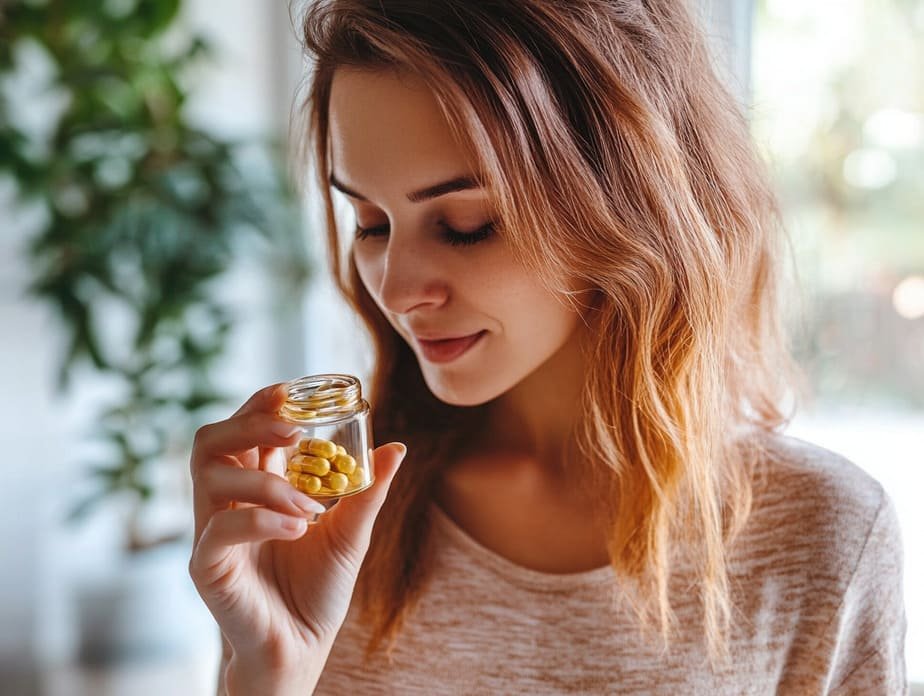Probiotics have surged in popularity and are now widely used, especially among women, as more and more people become aware of their potential benefits for gut health, immunity, and overall wellness.
Once considered niche, probiotics are now mainstream, making their way into the daily routines of women looking to improve their health naturally.
What Are Probiotics All About?
Probiotics are live microorganisms, often called "good bacteria," that provide numerous health benefits when taken in appropriate amounts.
These beneficial bacteria naturally live in your digestive tract and play an essential role in maintaining gut health, boosting immunity, and supporting various bodily functions.
For women, probiotics offer targeted benefits, including improved vaginal health, better digestion, and enhanced immune support.
As our understanding of the gut microbiome expands, the use of probiotics has become increasingly popular, particularly for women seeking to support hormone balance, digestion, and overall well-being.
So why do so many people endorse probiotics, and why are they especially important for women?
The answer lies in the unique ways probiotics can support women’s health—from promoting a healthy balance of vaginal flora to aiding in digestion and reducing the risk of common infections.
Scientific research has also shown the wide-reaching benefits of probiotics, from improving mood to supporting immune function.
With these combined effects, it’s no wonder women are increasingly turning to probiotics as a staple in their health routines.
Stay Informed About Your Health
If you're looking to elevate your health through healthy habits, balanced nutrition, and effective supplementation, sign up for our newsletter.
You'll get firsthand information on how to achieve your wellness goals and stay ahead on your health journey!

Benefits of Probiotics for Women
Probiotics offer numerous health benefits, many of which are particularly relevant to women’s health. Below are some of the most notable benefits, explained with scientific backing and data to support their effectiveness.
1. Supports Vaginal Health
One of the most important benefits of probiotics for women is their ability to support vaginal health by promoting a healthy balance of bacteria. Lactobacillus species, a type of probiotic, is naturally present in the vaginal microbiome and plays a key role in keeping harmful bacteria and yeast at bay.
Probiotic supplementation can help maintain this balance and reduce the risk of infections such as bacterial vaginosis and yeast infections.
Research and Data
A study published in The Journal of Lower Genital Tract Disease found that women who supplemented with Lactobacillus probiotics experienced a significant reduction in bacterial vaginosis and yeast infections.
The study reported a 35% lower recurrence rate of these infections compared to the placebo group.
2. Improves Digestive Health
Probiotics are well-known for their role in supporting gut health. By increasing the population of beneficial bacteria in the digestive tract, probiotics help balance the gut microbiome, improve digestion, and alleviate issues such as bloating, constipation, and diarrhea.
This benefit is especially important for women, as digestive problems can be exacerbated by hormonal fluctuations.
Research and Data
A study published in World Journal of Gastroenterology demonstrated that women who took a probiotic supplement containing Bifidobacterium and Lactobacillus species reported significant improvements in digestive symptoms.
The study showed a 40% reduction in bloating and a 30% improvement in regular bowel movements after four weeks of supplementation.
3. Enhances Immune Function
Probiotics also play a critical role in supporting the immune system. Since the gut is home to about 70% of the body’s immune cells, maintaining a healthy gut microbiome can help strengthen immune function.
Probiotics help stimulate the production of antibodies, improve the body's response to infections, and support overall immune health.
Research and Data
A study published in The American Journal of Clinical Nutrition found that women who took a daily probiotic experienced a 25% reduction in the frequency and duration of colds and respiratory infections.
The study highlighted that probiotics enhance immune defense by boosting the production of immunoglobulins and other immune cells.
4. Aids in Weight Management
For women looking to maintain a healthy weight or shed a few extra pounds, probiotics may offer support. Some research suggests that probiotics can help regulate metabolism, improve fat absorption, and reduce inflammation associated with weight gain.
Probiotics may also influence the hormones that regulate appetite, potentially helping to control food cravings.
Research and Data
A study published in Obesity Reviews found that women who took a probiotic supplement containing Lactobacillus rhamnosus experienced a 10% greater reduction in body fat compared to the placebo group.
The study concluded that probiotics may positively influence weight loss by altering the composition of gut bacteria.
5. Supports Mental Health
The gut-brain connection is a fascinating area of research, and studies have shown that the gut microbiome can influence mental health and mood. Probiotics, by promoting a healthy gut, can help reduce symptoms of anxiety, depression, and stress in women.
This is especially important for women, who are often more susceptible to mental health conditions due to hormonal changes throughout life.
Research and Data
A study published in Psychiatry Research found that women who supplemented with a probiotic for eight weeks reported a 20% reduction in anxiety symptoms and a 15% improvement in overall mood.
The researchers noted that probiotics positively affected the gut-brain axis, leading to improvements in mental health.

How Long Does It Take Probiotics to Work for Women?
The time it takes for probiotics to produce noticeable effects can vary based on the individual, the strain of probiotics being used, and the specific health benefits being sought.
For some women, improvements in digestion or a reduction in bloating may be observed within a few days to a week of starting probiotics.
However, for benefits like improved vaginal health, immune function, or mental health, it may take 4 to 8 weeks of consistent use to see significant changes.
What Do These Benefits Amount To?
For women, the cumulative benefits of taking probiotics can lead to improved health and well-being across multiple areas of life.
Enhanced digestion means fewer uncomfortable symptoms like bloating and constipation, while better vaginal health reduces the risk of infections and discomfort.
Probiotics can also help support mental clarity and mood, making it easier to navigate life’s daily challenges.
Together, these benefits promote a healthier, more balanced body, allowing women to feel and function at their best.
Who Are Probiotics For?
Probiotics can be beneficial for a wide range of women, but they may be especially valuable for:
- Women with digestive issues: For those who experience frequent bloating, constipation, or diarrhea.
- Women prone to vaginal infections: To support vaginal health and reduce the risk of bacterial and yeast infections.
- Women looking to support their immune system: For enhanced defense against common infections.
- Women interested in weight management: For those looking to improve metabolism and maintain a healthy weight.
- Women experiencing stress or mental health challenges: To support a healthy gut-brain axis and improve mood.
Research and Data
A study published in International Journal of Women's Health found that probiotics were particularly beneficial for women experiencing recurring vaginal infections, irritable bowel syndrome (IBS), and stress-related digestive issues.
The study concluded that probiotics are a valuable supplement for supporting women’s health across multiple life stages.
How Much Probiotic Should Women Take?
The dosage of probiotics can vary depending on the specific strain and product being used. Most probiotic supplements provide a dosage measured in colony-forming units (CFUs), which indicates the number of live bacteria in each serving.
For general health benefits, a dosage of 1 billion to 10 billion CFUs per day is common, although some products may contain higher amounts.
It’s important to follow the dosage instructions provided on the product label or consult with a healthcare provider for personalized guidance, especially if you are pregnant or have specific health conditions.
What Are the Limitations?
While probiotics offer numerous health benefits, it’s important to recognize their limitations.
Probiotics are not a magic solution and may take time to work. Results can vary from person to person, and while many women experience positive effects, others may need to experiment with different strains or formulations to find the one that works best for them.
Probiotics are most effective when used as part of a healthy lifestyle that includes a balanced diet and regular exercise.
Warning: It’s Not All the Same
When selecting a probiotic supplement, it’s important to pay attention to the quality and formulation. Not all probiotics are created equal, and the effectiveness can vary depending on the strain, dosage, and manufacturing process.
What to Look For in a Good Probiotic for Women
- Specific strains: Look for probiotics that include strains known to benefit women, such as Lactobacillus rhamnosus, Lactobacillus reuteri, and Bifidobacterium bifidum.
- High CFU count: A good probiotic should contain at least 1 billion CFUs per serving, with higher amounts often being more effective for certain health conditions.
- Third-party testing: Choose probiotics that have been tested by independent labs for purity and potency to ensure you’re getting a high-quality product.
- No unnecessary additives: Avoid probiotics with artificial colors, preservatives, or fillers.
What to Avoid in a Bad Probiotic for Women
- Low-quality strains: Avoid probiotics that do not specify the strains used or contain only generic “Lactobacillus” or “Bifidobacterium” without identifying the specific species.
- Low CFU count: Probiotics with a very low CFU count may not provide the desired benefits, especially for women with specific health concerns.
- Lack of transparency: Be cautious of brands that do not provide information on testing or certification.

Best Probiotics for Women on the Market
Here are some of the best probiotics for women available today, known for their quality and effectiveness:
- Garden of Life Dr. Formulated Probiotics for Women: This vegan probiotic contains 50 billion CFUs and 16 probiotic strains, including Lactobacillus reuteri and Lactobacillus rhamnosus, specifically formulated to support vaginal health and digestion. It’s one of the best probiotics for women over 40 and 50.
- Renew Life Ultimate Flora Women’s Probiotic: Designed with 25 billion CFUs and 10 probiotic strains, this supplement supports digestive, immune, and vaginal health. It’s particularly popular for women looking for targeted vaginal health support.
- Culturelle Women’s Healthy Balance Probiotic: This probiotic contains 15 billion CFUs and five clinically proven strains, including Lactobacillus rhamnosus, for maintaining vaginal flora balance and supporting immune health. It’s a great choice for women in their 20s and 30s.
- Ora Organic Lady Bugs Probiotics: A vegan-friendly option, this probiotic contains 16 billion CFUs and is designed to support women’s digestive and immune health. It’s ideal for women seeking a clean, organic option.
Top 15 Frequently Asked Questions About Probiotics for Women
- Are probiotics safe for pregnant women?Yes, probiotics are generally safe for pregnant women, but it’s important to consult with a healthcare provider to ensure the product is suitable for your specific needs.
- Can lactating women take probiotics?Yes, probiotics are safe for lactating women and can support both the mother’s and baby’s gut health.
- Do probiotics help with constipation?Probiotics, especially those containing Bifidobacterium, can help improve bowel regularity and alleviate constipation.
- What are vegan probiotics?Vegan probiotics are derived from plant-based sources and are free from any animal products, making them suitable for vegans.
- Are gummy probiotics effective?Gummy probiotics can be effective if they contain the right strains and dosages, but it’s important to choose a product that uses high-quality ingredients and provides adequate CFUs.
- Should women in their 20s take probiotics?Yes, probiotics can support digestive health, immune function, and overall wellness for women in their 20s, especially those with busy lifestyles or digestive issues.
- What are the best probiotics for women over 40?Women over 40 should look for probiotics that focus on digestive health, immune support, and vaginal health, with strains like Lactobacillus rhamnosus and Bifidobacterium.
- What are the best probiotics for women over 50?For women over 50, probiotics that support bone health, digestion, and immune function are ideal. Look for products that contain strains known to support aging.
- Can probiotics help with bloating?Yes, probiotics can help alleviate bloating by balancing the gut bacteria and promoting better digestion.
- How do I know if I need probiotics?If you experience frequent digestive issues, such as bloating, constipation, or diarrhea, or if you frequently get sick, probiotics may help restore balance to your gut microbiome.
- Are there probiotics for menopause?Yes, certain probiotics are designed to support women going through menopause by addressing digestive changes, weight management, and immune health.
- Can probiotics interact with medications?Probiotics are generally safe, but it’s always a good idea to check with your healthcare provider if you are on medication, especially antibiotics, as probiotics can affect how medications work.
- Can I take probiotics every day?Yes, probiotics are designed for daily use, and consistency is key to experiencing the full benefits.
- Are probiotics good for skin health?Yes, probiotics can support skin health by reducing inflammation and promoting a healthy gut-skin connection, which can improve conditions like acne and eczema.
- Can probiotics help with mental health?Yes, probiotics can support mental health by improving the gut-brain connection and reducing symptoms of anxiety, depression, and stress.
Final Thoughts on Building Long-Term Health
Remember, building and maintaining good health takes time and consistent effort. Your well-being isn’t built in a single day, but the choices you make today can have a lasting impact.
By making informed decisions about your supplements and overall health practices, you can reach your wellness goals.
If you need guidance on your journey, sign up for our newsletter, and we’ll be there to help every step of the way!

